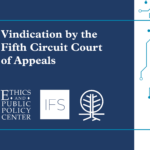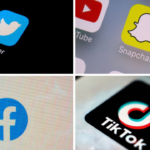
Published October 9, 2023
Around 15 years ago, Big Tech came up with an idea: to sell products that promise to “connect” everyone in the world and make them feel popular. But the deeper objective was to make insane profits by engineering addiction among consumers, whose every click (and lingering cursor) became a commodity for sale to advertisers. Making kids dependent on these platforms was essential to the business model—because if you get them while they’re young, you get them for life. The design of these platforms: recommendation algorithms, “like” buttons, and constant notifications, all work toward this end.
The result of this massive social experiment on our children has been catastrophic. The U.S. Surgeon General Vivek Murthy recently issued an advisory warning declaring a mental health emergency among teens. And the science only confirms what we have all already observed with our own eyes: social media has had a profoundly negative effect upon our culture. Attend any family gathering: children don’t speak to parents, grandparents, uncles, aunts—or even each other. They have been refashioned into solipsists, without the need for parental and societal approval that cultural transmission requires.States are trying to respond and help parents protect their children, but their efforts are being thwarted by courts weaponizing the First Amendment to protect Big Tech companies over our children. But the truth is these social media laws are constitutional. And they are necessary. In just the past year, four states: first, Utah, quickly followed by Louisiana, Arkansas, and Texas, all passed laws requiring age verification and parental consent for minors to open social media accounts. The speed with which legislatures adopted these proposals speaks to a societal crisis: parents’ genuine inability to protect their kids online. Given that even the best parental control software cannot offer full protection, parents face a Hobson’s choice: completely isolate their kids from those aspects of school, social, and cultural life only accessible via social media or surrender their kids to Mark Zuckerberg and Sundar Pichai’s unholy embrace. Of course, the platforms, facing a threat to their profits, have challenged these laws under the First Amendment—and have had some initial success with Obama-appointed district court judges, notably Judge Timothy Brooks, who enjoined the Arkansas law. The courts’ unwillingness to protect kids against Big Tech reflects a willful choice to apply First Amendment precedent in an ideological way. The Left abandons free speech, supporting hate speech restrictions so broad that it targets traditionally conservative sentiments, but, when it comes to Republican initiatives to protect kids, leftist judges renew their ACLU membership. It is important to note that judicial statutory review under the First Amendment turns on three questions: (1) does the statute prohibit speech or action; (2) does it prohibit the content of speech or the way it is expressed, i.e., is it “content-neutral”—the latter receives a more deferential judicial review; and (3) whether the law is appropriately tailored to only prohibit speech the government has an interest in regulating. On all three counts, Judge Brooks got it wildly wrong. First, requiring parental consent for kids to form accounts with social media does not regulate speech; it regulates contract. Just as states require parental consent for kids to sign liability waivers or life insurance contracts, so states may require parental consent for the platforms’ terms of service that give away their kids’ rights to data, privacy, as well as a host of other legal rights. And, even though the platforms’ terms of service contract involves “expression,” it does not fall out of the general rule that parents can control their kids’ contractual obligations. States routinely require parental consent for tattoos—and they are quite expressive (and First Amendment protected). Second, even if it is regulated speech, the judge erred in claiming the Arkansas law is content based. Judge Brooks dismissises Arkansas’s argument that “age-verification requirements are merely a content-neutral regulation on access to speech at particular ‘locations’” and psychologizes the Arkansas legislature to conclude that it was protecting children from certain types of harmful content such as pornography or “so-called ‘bullying’ speech,” as he put it.But that is not correct. Social media, as media, regardless of the type of content, is inherently harmful. The research is clear. Its aggressive algorithms prey on children’s vulnerabilities. Children and teens suffer because they live in constant need of “likes” on their posts, or endure seeing friends attend events to which they weren’t invited, or fear pile-on ostracism. Social media age verification does not target certain types of speech—it targets a form of communication that encourages social exclusion, competition for approval, and fear of isolation. These laws are thus not age-gating certain types of content like age-verification laws for adult websites, but seeking to guard children from the harms inherent to the design of these platforms by restoring parental authority. Third, age verification laws are narrowly tailored. Social media, as a form, is harmful to kids. These laws regulate that—and no more. They function like a prohibition to kids entering a bar, which is an environment that poses risks to children, including but not limited to buying prohibited substances. In concluding the statute overbroad, Judge Brooks says the Arkansas law is like checking ID at the “front door” of the “mall,” where there are both bars (harmful for kids) and bookstores (good for kids). This analogy, however, is not accurate because it misses what’s wrong with social media. Social media is not in reality like the mall, but like the bar. After all, like other venues in shopping malls, bars sell soda and food that minors may lawfully purchase. But the point is that the atmosphere of a bar is inappropriate for children and presents an intolerably high probability of unlawfulness. Similarly, the online environments of social media are themselves inherently bad for kids—and harmful illegality ranging from child pornography to human trafficking lurk in its corners. That being said, social media age verification must be reconciled with precedent. Most prominently, in Brown v. Entertainment Merchants Association, the Court overturned a California requirement for parental consent for “violent” video games. Unlike the current age- verification laws, the California law was content-based, not content-neutral, only restricting a certain type of speech, i.e., “violent” speech. Most important, the Court found that evidence of harm was “not compelling.” Whereas for social media, even Judge Brooks found the evidence of harm to be substantial. Furthermore, purchasing a video game is a one-time transaction, unlike the ongoing contractual relationship from opening a social media account. The Arkansas ruling was the first salvo in a long battle. It is discouraging that Judge Brooks got it so wrong. But social media age verification is constitutional. And judges must wake up. It’s not 1990. Social media has utterly ruined American childhood—for profit. The First Amendment cannot be applied in a wooden and partisan way to render Americans incapable of creating a healthy, happy culture for their kids. These wrongs must be righted by the courts or else we will end up with a dangerous constitutional order that cannot bear to protect our children from the predatory technologies of multinational corporations.
Clare Morell is a Senior Policy Analyst at the Ethics and Public Policy Center, where she directs EPPC’s Technology and Human Flourishing Project. Prior to joining EPPC, Ms. Morell worked in both the White House Counsel’s Office and the Department of Justice, as well as in the private and non-profit sectors.











